- Our History
- The History of Neurology and Timeline
- Timeline
- Frances Elizabeth Jensen, Chair

FACULTY INTERVIEWS
Dr. Matt Stern interviews Dr. Frances Jensen: Listen to a snippet of Frances E. Jensen talking about challenges: Check out full video here: Jensen Interviews: full and snippets
Frances Elizabeth Jensen, Chair, 2012 — present
Dr. Jensen is Professor of Neurology and Chair of Neurology at the Perelman School of Medicine, University of Pennsylvania, and Co-Director of Penn Translational Neuroscience Center.
She was formerly Professor of Neurology, Harvard Medical School, Director of

Translational Neuroscience and senior neurologist at the Brigham and Women’s Hospital and Boston Children’s Hospital. After receiving her AB from Smith College and MD from Cornell Medical College, she obtained her neurology residency training at the Harvard Longwood Neurology Residency Program. Her research focuses on mechanisms of epilepsy, and the interaction of epilepsy with other disorders such as autism and dementia, to elucidate new therapies for clinical trials development. She has authored over 150 manuscripts on subjects related to her research and has been continuously funded by NIH since 1987 and was the recipient of a NIH Director’s Pioneer Award in 2007 and a NIH-NINDS Javits Award in 2020. Dr. Jensen was elected as a member of the National Academy of Medicine in 2015 and the recipient of the Smith College Medal in 2020. Dr. Jensen has trained numerous clinical and basic research fellows who now hold independent faculty positions nationally and internationally. Dr. Jensen served as President of the American Neurological Association (2021-2023) and President of the American Epilepsy Society in 2012. She has served on multiple leadership boards including Society for Neuroscience and NIH. Dr. Jensen is a Trustee of the Franklin Institute in Philadelphia and is involved in community outreach for brain research and education. In addition, Dr. Jensen is an advocate for awareness of the adolescent brain development, its unique strengths and vulnerabilities, as well as their impact on medical, social, and educational issues unique to teenagers and young adults, and author of the book “The Teenage Brain", released by Harper Collins in 2015/16, translated and published in over 25 languages worldwide.
Learn More about today's Neurology Department
Departmental Structure Organizational Leadership Chart: Our Team
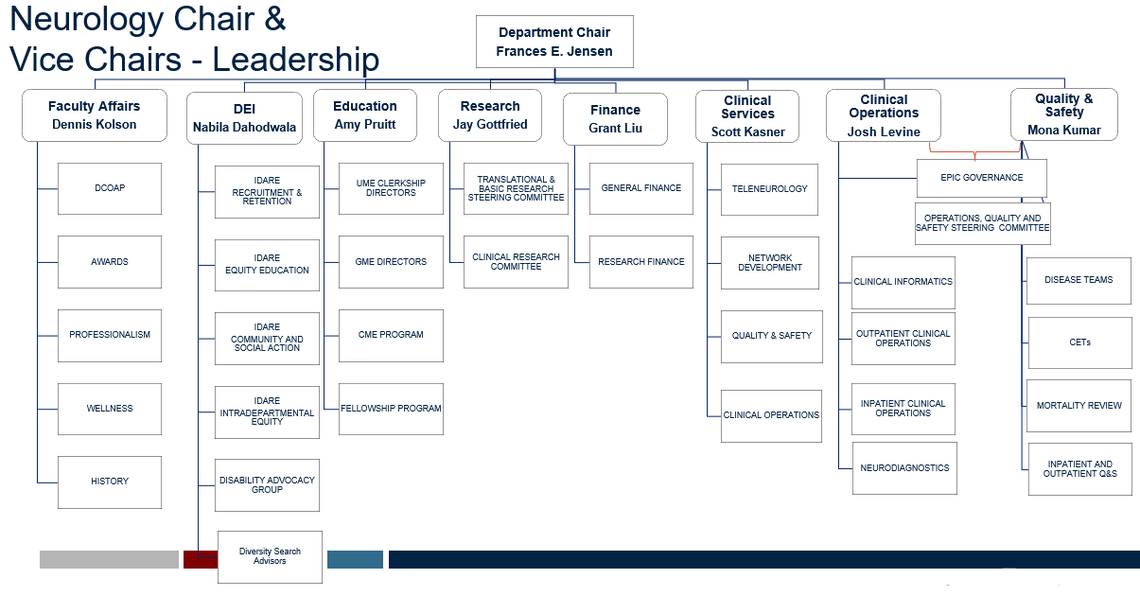
Faculty and Administrative Leaders of Neurology
|
Chair of Neurology Department - Frances E. Jensen, MD, FACP |
|
|
Vice Chairs: (click on any program to visit the specific program's page)
|
|
|
Division Chiefs (click on each to visit their clinical division pages)
|
|
|
Site Chiefs
|
Program Directors
|
|
Administrative Leaders:
|
|
Penn/CHOP Integrated Neurology Programs

Penn176 Faculty |
CHOP79 Faculty |
|
Clinical: Outpatient - >90K per year 3 central inpatient sites >2000 discharges 7 off-site inpatient sites 6+ satellite locations and affiliates Research: >$55M/yr in external research funding 65% federal ~220 clinical trials
|
Clinical: 1 central and 9 satellite outpatient sites >37,000 outpatient 3 inpatient sites >11,000 inpatient days Research ~10M/yr in external research funding 70 clinical trials
|
CLINICAL
Penn Neurology Clinical Programs and Services
Visit our Clinical Services and Programs site for detailed information on how we treat patients with basic and complex neurological disorders or visit: Neurology - Penn Medicine
Clinical Neurology Locations are shown on this chart and map:
Neurology's Site Growth 2012 - Present
|
RESEARCH
Research Programs
Many members are actively engaged in the Department of Neurology Research programs, often in collaboration with basic scientists and clinicians in other departments and institutions. This research covers a wide range of topics in basic and translational research. Active basic research efforts explore the anatomy, physiology, development and genetics of the peripheral and central nervous system. Investigations can range from explorations of the molecular basis of neural processing to imaging and behavioral investigations in humans.
Translational Centers of Excellences - Neurology Centers and Programs |
|
|
Penn Center for Neuro-Cardio Protection (PCNC)
|
Neuroepidemiology, Neurological Outcomes & Disparities Research (website forthcoming) |
|
Other Neurology Departmental and Affiliated Centers to review the full list click here. |
|
EDUCATION
The Neurology Residency Program at the University of Pennsylvania creates leaders in Neurology, balancing clinical training, a broad educational curriculum, and career development.
The Neurology Fellowship Programs seek fellows who are driven to advance the field of Neurology. The programs balance breadth and depth in clinical training under world-recognized clinicians and educators. Neurology fellows frequently pursue additional, formal training in research, education or healthcare administration.
|
2024 Current Fellowships: |
|
| Program Name | Program Director |
|
Cognitive and Behavioral Neurology |
PD: Sanjeev Vaishnavi |
|
Neuroimmunology/Multiple Sclerosis (MS) |
co-PD: Jennifer Orthmann-Murphy, MD, PhD co-PD Rohini Samudralwar, MD |
|
Epilepsy |
PD: Saurabh Sinha, MD, PhD |
|
Intracranial Electroencephalography |
APD: Genna Waldman, MD |
|
Clinical Neurophysiology |
PD: Saurabh Sinha, MD, PhD |
|
Neuro-Ophthalmology |
PD: Kenneth Shindler, MD, PhD |
|
Neurohospitalist |
PD: Anne Douglas, MD |
|
Neuro-Oncology |
PD: Richard Phillips, MD, PhD |
|
Vascular Neurology (Stroke) |
PD: Donna George, MD APD: Steven Messe, MD |
|
Neuromuscular |
PD: Chafic Karam, MD |
|
Movement Disorders |
|
|
NCC |
PD: Danielle Sandsmark, MD, PhD APD: Matthew Michaels, DO |
|
Cerebrovascular Disease (StrokeNet) |
PD: Scott Kasner, MD, MCSE |
|
Headache |
PD: Seniha Ozudogru, MD |
WELLNESS
Programs Sustaining Culture: Awards, DEI, Wellness, Professionalism, History Project
The department of Neurology has many other programs that are core to the mission of the department which begins with creating and sustaining an inclusive, diverse, and antiracist culture that ensures equitable engagement with patients and between all members that collectively form the department. We refer to this program as IDARE. Other programs have organic overlaps with sections of IDARE which further strengthens the missions and objectives of these areas. The Awards and Wellness Program has often formed synergies because of the similarities in goals, to eliminate equity gaps and to continue supporting a culture of inclusion. Professionalism is also a vital program of the department that provides educational and career developmental lectures for members of the department. Expert speakers are invited to deliver talks on various relevant topics that are within their expertise and this is further educate the department on a particular space, provide useful tools and build on current skills.
A special History Project was formed to celebrate a special anniversary of the oldest Penn Neurology being the first neurology department in the nation and collect 150 years of this historical information to form a timeline and repository of facts, interviews of living alumni, and highlight the many milestones of the past and present faculty and staff of Neurology.
PHILANTHROPY
Philanthropic Overview
Our philanthropy efforts play a pivotal role in elevating patient care, driving cutting-edge research, and enhancing service offerings to advance the missions surrounding neurological diseases within the Department of Neurology. Through generous donations and support, we can provide patients with access to state-of-the-art treatments, innovative therapies, and personalized care that significantly improves their quality of life. These funds also empower our researchers to push the boundaries of scientific discovery, leading to breakthroughs in understanding the complexities of neurological conditions and developing novel interventions. Moreover, our philanthropic initiatives enable us to expand our service reach, enhance community engagement, and raise awareness about neurological diseases, ultimately fostering a culture of compassion, innovation, and excellence in our pursuit to combat these challenging disorders.
Neurology has 11 endowed chairs in the department.
To make a donation, please visit here
Major Discoveries and Events at Penn during this time
- School issues university wide action plan for diversity an excellence 2012
- Dr. Ali Jadbabaie, professor of electrical and systems engineering in Penn's School of Engineering and Applied Science, is the recipient of a 2012 Multidisciplinary University Research Initiative (MURI) Award. His project, "Evolution of Cultural Norms and Dynamics of Socio-Political Change," will include collaborations with researchers at Cornell, MIT, Stanford and Georgia Tech. Funding for the project is $7.5 million over five years.
- Anita Allen appointed vice provost for Faculty in 2013 by Provost Vincent Price
- Vice Dean for Diversity and Inclusion at PSOM: Eve J. Higginbotham August 2013 – first Vice Dean for DEI.
Penn medicine performs 1,000th lung transplant 2016
Grand Opening of Perry World House: September 2016
Major Translational Research and Clinical Advances during this era
Major Accomplishments of Jensen Era:
- Stroke – reversal of stroke with TPA/altepase, then thrombectomy up to 24 hours after stroke
- Epilepsy – >10 new antiepileptic drugs, implementation of laser ablation, development and implantation of closed loop stimulators
- Multiple Sclerosis - Immunotherapies for progressive MS- Ocrevus, and second generation
- Movement Disorders – new biomarkers, disease modifiers, DBS, focused ultrasound
- Cognitive Neurology – biomarkers (PET, blood) to predict dementia, aducanamab Rx
- Neuromuscular – Gene therapy – Spinraza/Zolgensma – now neuropathy, ALS, dementia
- Neuro-ophthalmology – Optical coherance tomography to assess retinal disease
- General Neurology – autoimmune panels, telemedicine, CGRP inhibitors for migraine
- Neurocritical Care – State of-the-art neuroinformatics/AI
People of this era
- Roy Hamilton (first black full tenured professor in Neurology at Penn)
See Department Photos from this Era
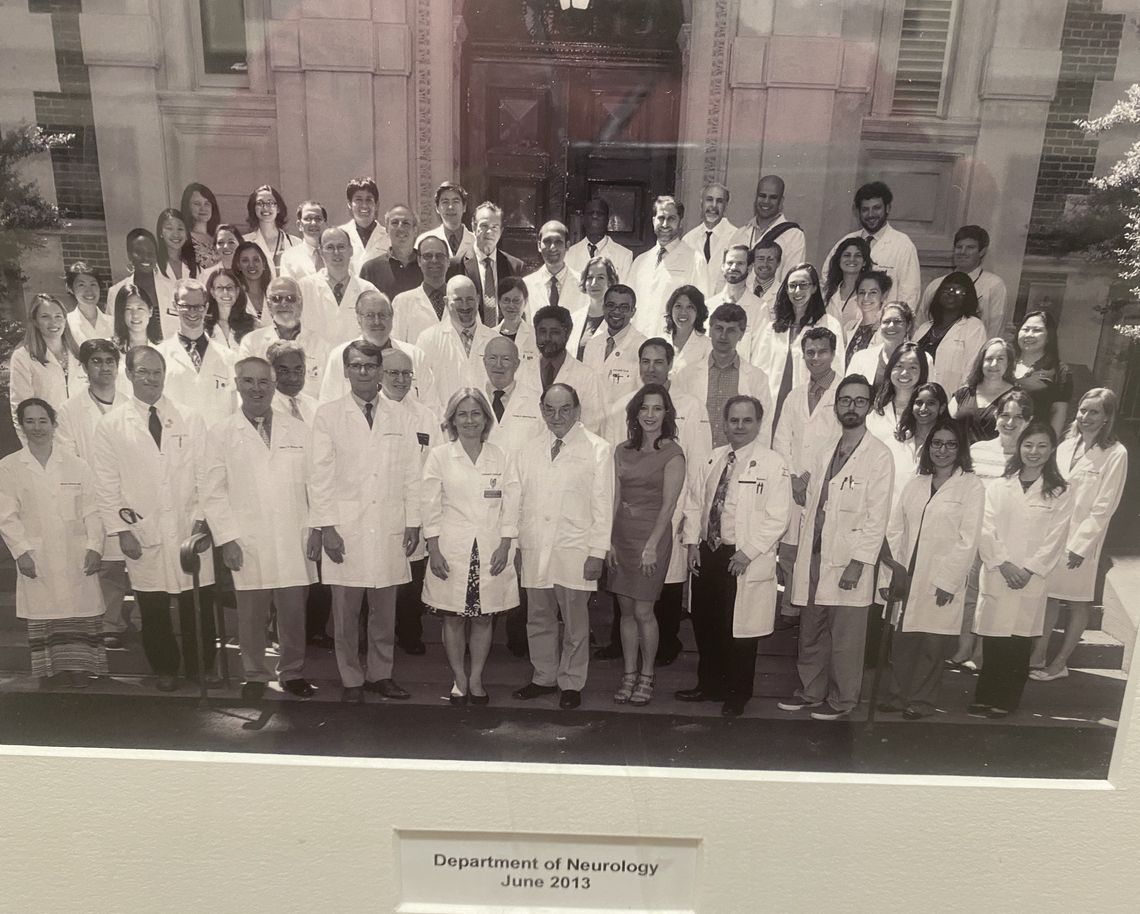
Neurology Firsts of this Era
2013 Grant Liu elected the first Director of the Consortium of Pediatric Neuro-ophthalmologists
2015 Anjan Chatterjee First Neuroaesthestic Center
2020 First Successful treatment with Baricitinib of the of The Aicardi–Goutières syndrome, a genetic interferonopathy that is associated with severe disability and death

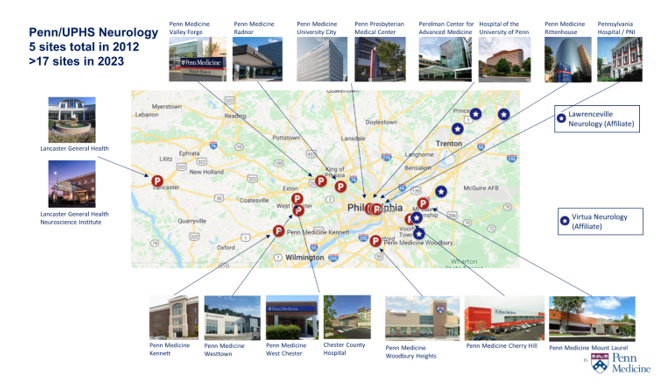
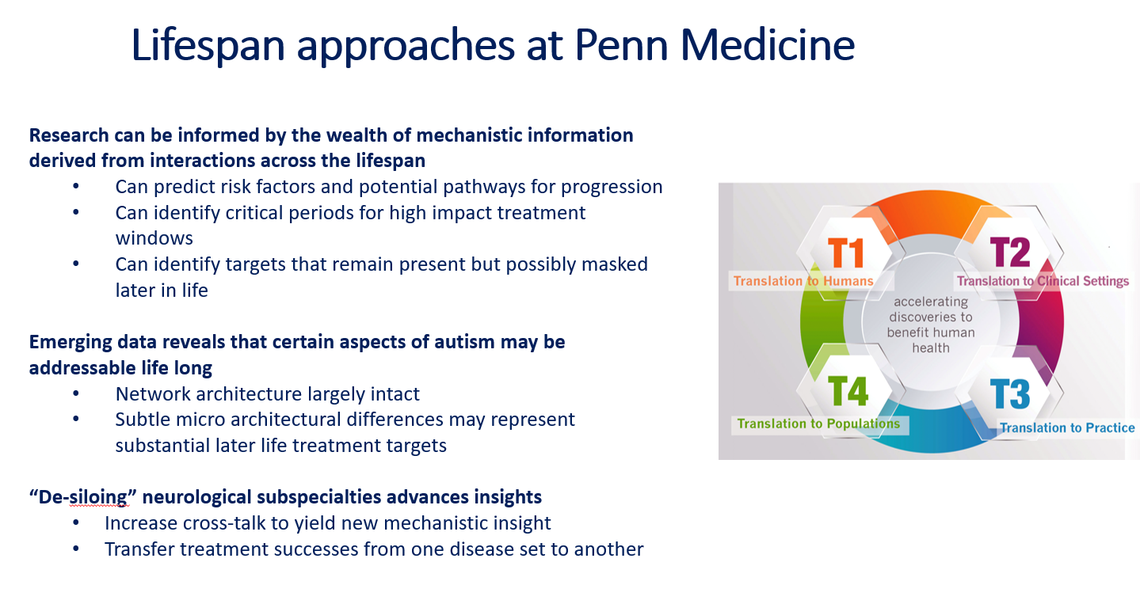
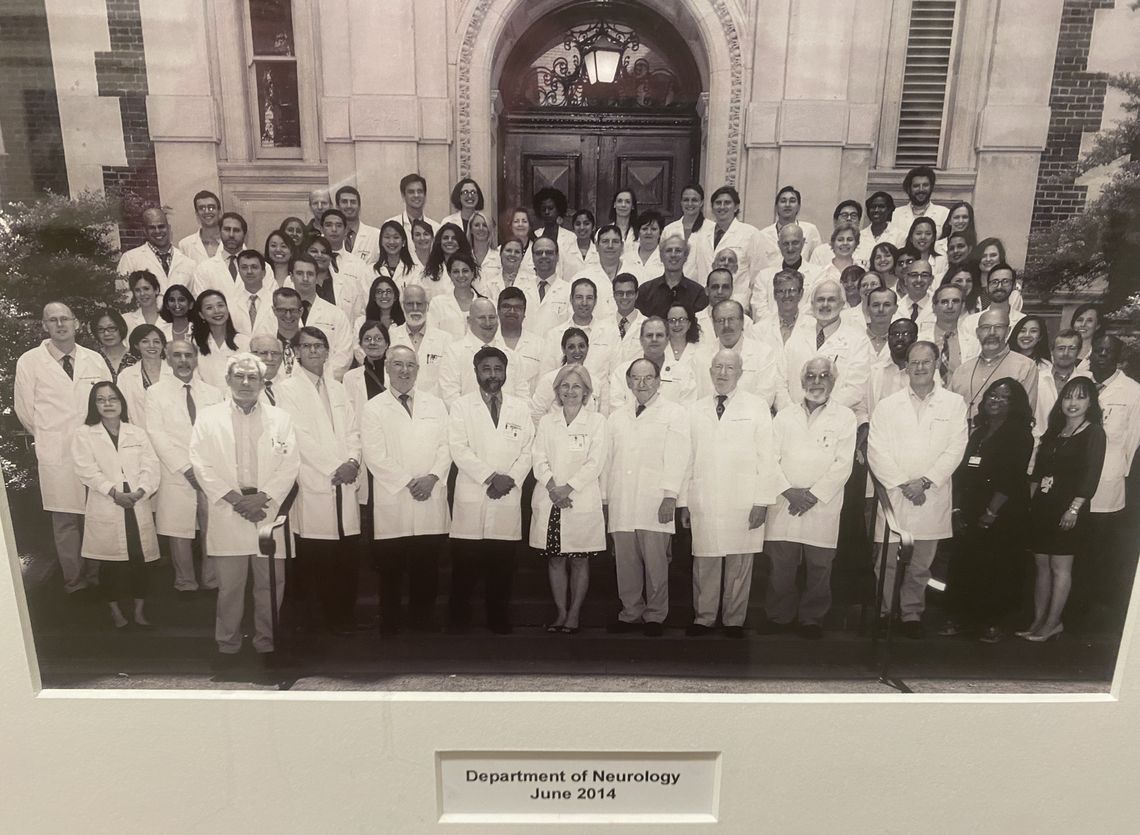 Annual Group Photo’s (Jensen Era)
Annual Group Photo’s (Jensen Era)